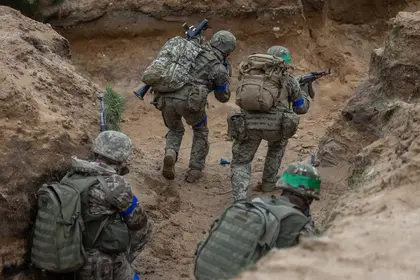The Verkhovna Rada passed a law on Wednesday allowing prisoners serving time to voluntarily enlist into the ranks of the Armed Forces of Ukraine (AFU). According to the law, individuals serving sentences have the right to be released early in order to join the AFU.
While most prisoners will be eligible for early release, the draft law prohibits the mobilization of individuals convicted of the most serious offences, such as:
JOIN US ON TELEGRAM
Follow our coverage of the war on the @Kyivpost_official.
- Crimes that threaten the national security of Ukraine
- Premeditated murder of two or more people
- Rape, sexual violence, molestation of minors
- Causing death while driving under the influence
- Illegal drug-related activities
- Corruption offenses.
So that means that murderers can serve?
Indeed, they can. The law allows individuals who have committed murder or manslaughter to join the AFU.
However, the law stipulates that individuals who have committed two or more premeditated murders are not eligible.
“As far as I recall the text of the law, there is no restriction on persons who have committed a single murder, only on those who have committed double or triple murder,” criminal lawyer Konstantin Padalka explained. “But it’s crucial to understand that circumstances surrounding each murder can vary.”
The rationale behind the decision is that for some commanders, an otherwise upstanding individual who happened – either mistakenly in a fit of rage – to kill someone might be preferable to someone inclined to dishonesty or chronic debauchery.
Traitors, rapists, junkies and drunk drivers need not apply
The law also prohibits the mobilization of individuals convicted of crimes against the security and territorial integrity of Ukraine (e.g., high treason), sexual offenses (specifically rape), involvement in selling or transporting narcotic substances, and causing accidents while driving under the influence of alcohol.

How Ukrainians React to Zelensky’s New Plan
However, not all individuals convicted of murder or other crimes are eligible for mobilization; only those who meet the criteria for conditional early release are eligible.
Conditions for early parole
The essence of the parole procedure is that individuals who have served most of their court-imposed sentence can be released, provided they have received a positive recommendation from the prison administration, with no infractions, and have exhibited good behavior and diligent work.
“An individual who has served three-quarters of their sentence for a serious crime is considered to have completed their term, with the remainder of the sentence being replaced by probation and beneficial work,” Padalka said. “In this case, mobilization replaces those remaining terms.”
To be eligible for parole, individuals must have served half of their sentence for lesser or unintentional crimes. For serious crimes, they must serve three-quarters of the term. In the case of premeditated murder, this equates to 7.5 years out of a 10-year sentence.
In other words, not every murderer may qualify for this opportunity, only those who have nearly completed serving their time.
What do soldiers think about it?
Among Ukrainian military personnel interviewed, some have interacted with former prisoners.
“In our unit, we had four of them. One served time for manslaughter – he’s a wrestler and accidentally broke his opponent’s neck on the mat. He performs well, and there have been no complaints about him. Others were incarcerated for fraud and robbery; I can’t speak negatively about them,” Volodymyr, a soldier from one of the Territorial Defense Brigades told Kyiv Post.
Another soldier from one of the brigades currently withdrawn to the rear for reinforcement told Kyiv Post: “We’re tired. We understand that we may not receive sufficient numbers of young, healthy recruits anymore. Sending anyone, even if they’re ex-convicts, is better than sending no one at all.”
What do prisoners think?
The exact number of prisoners eligible for mobilization remains unclear. Not everyone will qualify for early release.
According to public figure and blogger Volodymyr Nesterenko, who often engages with prisoners, “civilians” – those prisoners who are not professional criminals or “thieves” – are more inclined to enlist.
“‘Thieves’ on probation aren’t being released; they’ll serve until the end of their sentence,” Nesterenko said.
Yet there’s a hierarchy among prisoners as well. The “thieves” tend to command among the prison population, and at the war’s outset, they agreed that everyone should defend their homeland, Nesterenko said. This would open the door for “civilians” to go free without retribution.
So how is this different from Russia dragooning their prisoners?
Due to the stringent restrictions outlined in the law, sources interviewed by Kyiv Post suggest that it is unlikely Ukraine will be able to mobilize more than 10,000 to 20,000 prisoners.
By comparison, in Russia, the number of prisoners mobilized solely within Wagner’s structures was estimated to exceed 100,000. Moreover, in Russia, serving time and fulfilling conditions for conditional early release were not prerequisites.
As Padalka points out, there’s no indication in the law that Ukraine will follow Russia’s lead in forming entirely separate units from enlisted prisoners – such as the Storm-Z units Russia has used as cannon fodder in the Donbas.
“The law doesn’t imply the creation of separate divisions. Moreover, this process is gradual; they won’t all be mobilized at once. It appears they will be gradually integrated into existing units. And establishing new divisions is illogical as long as we have existing ones that require reinforcement,” Padalka said.
You can also highlight the text and press Ctrl + Enter






